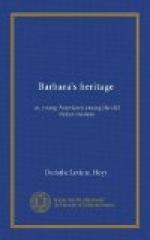“Shall we ever really know anything about it all?” asked the girls of each other. Even Miss Sherman, who had been able to get a room in a small hotel close by, and so was still their constant companion, wore a little troubled air now and then, as if there were something she ought to do and did not know how to set about it.
They drove all over the city; saw its ancient ruins—the Colosseum, the Forums, the Palatine Hill, the Baths of Agrippa, Caracalla, Titus, and Diocletian; visited the Pantheon, Castle of St. Angelo, and many of the most important churches. They drove outside the walls on the Via Appia, and saw all the many interesting things by the way. They sought all the best points of view from which they could look out over the great city.
One afternoon they were all together on the wide piazza in front of San Pietro in Montorio, which commands a very wide outlook. Here, after having studied the location of chief points of interest, they gave themselves up to the delight of a superb sunset view. As they lingered before again taking their carriages, Malcom told some of his morning experiences, and Barbara wistfully said:—
“I wonder if we ought not to begin some definite study of Roman history and the old ruins. Betty and I have taken some books from the library in Piazza di Spagna, and are reading hard an hour or two every day, but it gives me a restless feeling to know that there is so much all about me that I do not understand,” and she looked inquiringly at Mr. Sumner.
“Robert and I have talked over this very thing,” replied Mrs. Douglas.
“Shall I tell them what we think?” she asked her brother, as he rather abruptly turned away. On his assent she continued:—
“It is a familiar question, since I very plainly remember hearing my father and mother talk of it when I was your age, and Robert was but a lad. My father said it would take a lifetime of patient study to learn thoroughly all that can to-day be learned of what we call ancient Rome—the Rome of the Caesars; and how many Romes existed before that, of which we can know nothing, save through legend and tradition! ’Now, will it not be best,’ he asked, ’that we read all we can of legend and the chief points of Roman history up to the present time, so that the subject of Rome get into our minds and hearts; and then try to absorb all we can of the spirit of both past and present, so that we shall know Rome even though we have not tried to find out all about her? We cannot accomplish the latter, and if we try I fear we shall miss everything.’ My mother agreed fully with him. And so, many evenings at home; father would read to us pathetic legends and stirring tales of ancient Roman life; and we would often go and sit amidst the earth-covered ruins on the Palatine. Here, children, I have heard your own dear father more than once repeat, as only he could, Byron’s graphic lines:—




